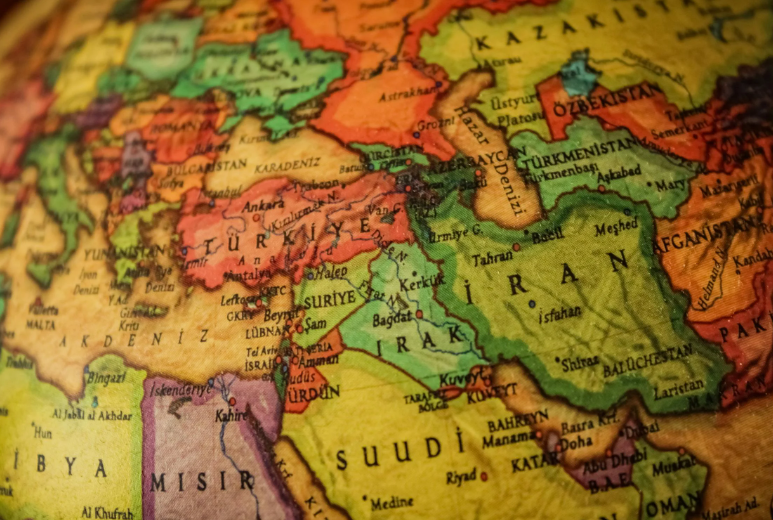Visiting the Middle East During Conflict: The Israel-Iran War

By Rena Elhessen / Arab America Contributing Writer
The ongoing Israel-Iran war began last week, and the affects of this conflict are already being seen throughout the region of the Middle East. The geographic positions of Israel and Iran have left the rest of the Arab world closing off airspace and redirecting flights, leaving Arabs and Arab Americans stranded and reconsidering their flight. However, through these dire times, some Arab Americans continue to visit their home countries. Whether driven by the need to deliver their family supplies, or the desire to return to their homeland, Arab Americans continue to board at-risk flights.
The Israel-Iran War
On Thursday, Israel launched what it claimed was a “preventive” strike against Iran, citing concerns about their development of nuclear weaponry. Iran labelled the attacks as a declaration of war, responding with a sequence of missile attacks. As this exchange enters in sixth day, civilian populations of both nations bear the brunt of the conflict.
However, the spillage of the effects of this conflict has impacted flights within the Arab world, leaving people stranded. The exchange of missile fire from both nations has paralyzed the use of airspace between both countries, meaning the Arab nations, though uninvolved in this conflict, continue to take on the negative effects of this war.
The countries caught in the crossfire due to geographic placement include Iraq, Syria, Lebanon, and Jordan.
Regional Impacts of the Israel-Iran War
While flights to Israel and Iran have all been cancelled, so have flights to other countries within the airspace between them. As projectiles continue to be fired in a tit for tat exchange, the airspace above the Middle East is put directly at risk. The increased fear and violence in the region is set to impact many more countries. As tensions rise, so does the fear that other countries may join this conflict.
Iraq
Of the countries to close its airspace is Iraq, quashing Iraqi-Americans’ hope of visiting for the Summer. Being the closest to Iran, Iraqi airports have all closed. Those who remain in Iraq and can afford to escape have been permitted to cross into Turkey via their shared border.
Though Iraq remains neutral throughout this conflict, it continues to face the damage of the war. Downed missiles and drones have fallen over Iraq, damaging houses and causing fires.
Lebanon
Due to its geographic location sharing borders, Lebanon has also been put at risk through this ongoing missile exchange. Though airlines have begun canceling flights to Beirut, Lebanon remains steadfast in keeping its airspace open. The state news agency NNA said the country would reopen its airspace in the morning and would shut it down from 10:30 PM till 6:00 AM on Sunday.
Though the Iranian-backed militia group Hezbollah operates within Lebanese borders, the organization has remained silent during this war. Following the Israel-Hezbollah war in November, the group has not indicated that it intends to join in this conflict. This comes after President Aoun has repeatedly warned Hezbollah against joining this conflict, as it would also drag Lebanon into a needless war.
Regardless of this silence, the Lebanese are still affected by this conflict. The South of Lebanon has also been subject to downed missiles and drones, damaging houses and infrastructure. While many Lebanese abroad are unable to return home.
Jordan
Jordan has condemned Israel for the “blatant violation of the sovereignty of a UN member state”, promising to guard its citizens and sovereignty. As a result, they have continued to intercept Iranian drones and missiles that enter the kingdom’s airspace. This residue continues to fall on residential homes. Additionally, this continuing conflict is estimated to affect Jordan’s electricity through the suspension of Israeli gas exports.
This conflict is expected to damage tourism for the nation, but the Jordanian airspace remains open.
Syria
The infrastructure of Syria was undergoing renovations following the recent regime change, so its airport remains unoperational. Nonetheless, Syria faces implications from the war. Downed missiles have fallen in Syria, damaging infrastructure and reportedly killing one woman. Due to the geographic closeness of the country, missiles have been seen daily streaking across the sky.
However, there is a reported consensus of relief to not be involved in this conflict. After years of civil war, some Syrians hold grudges against both Israel and Iran. Iran, having backed the Assad regime for years, and Israel, continuing to bombard the Syrian countryside following the fall of the Assad regime.
The Need to Return Home Despite War
Through this ongoing war, Arab nationals and Arab Americans are continuing to return to their homeland. Though some airlines have begun to cancel their incoming flights, few continue to land in this airspace. Of them, are Middle East Airlines and Turkish Airlines.
The Summer season brings immense tourism to the region, including Arab Americans wanting to visit family and friends. Though the Israel-Iran war continues, flights are still landing in Lebanon and Jordan.
Though the possibility of danger remains, Arab Americans continue to return to their motherland. Perhaps it is the need to remedy their diaspora, or the need to make deliveries of supplies to their families back home. Regardless, the continued landing of flights in this region marks the Arab perseverance to return home.
Want more articles like this? Sign up for our e-newsletter!
Check out our blog here!








